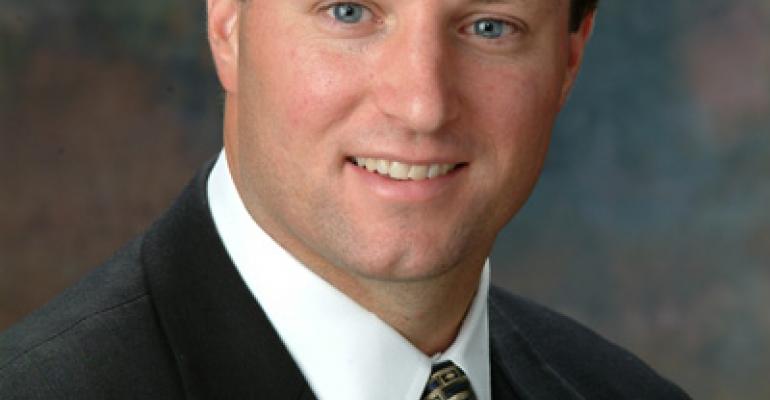Geoff Hill has a unique view of the restaurant industry and the volatile financial market. Previously, he had served as president of Cinnabon from 2006 to 2009. Today, he monitors the big economic picture as vice president of Roark Capital Group, an Atlanta-based private equity firm that owns Arby’s, McAlister’s Deli, Moe’s Southwest Grill, Cinnabon, Carvel Ice Cream, Seattle’s Best Coffee, Schlotzsky’s, Wingstop and Auntie Anne’s.
Hill recently shared his observations about the marketplace with Nation’s Restaurant News.
The market’s roller-coaster ride is scary for restaurateurs. What is your main message to operators?
I would start with the premise of taking the emotion out of it. It’s a scary time. There are a lot of negative things flying all over. Clear your mind of the emotion. If you are a CEO or an operator or a GM, right now people are looking at leaders. And they’re looking for a response. Keep emotions out of it.
For a restaurant, get back to the core basic of success for your brand. Focus on what made your brand great. Even with the market acting like it is, people are still eating. People who are winning in restaurants have gotten back to the basics. Do better service, do better food. It works. Spend more time on the restaurant and the core brand attributes.
What impact did the debt-ceiling crisis have on operators and restaurant consumers?
In terms of how it related to the restaurant industry, it had minimal to no effect. The effect to me is that fear may have crept in for the consumer, the guest. Yes, people make decisions on a daily basis. But people are still going out to eat. It might make a difference on people buying a big item, but not on small items.
What should operators be doing in this unstable economic environment?
Stay true to the brand. Stay true to long-term strategy. In a pure reactionary way, some brands changed strategy because of short-term commodity prices and created a food menu for a lower food cost, even though it doesn’t fit the brand. So, stay true to the brand. Don’t quickly change it, because three years from now the consumer will look at you and won’t know you. McDonald’s evolved over a long term. Changing quickly on a monthly basis because of bad news doesn’t work.
It’s also a great time to buy advertising or negotiate a better lease term, if you can get it. There’s low-interest capital and you can negotiate most anything on the service side, whether it’s remodeling, construction or equipment. It’s a good time to [negotiate better deals].
If the brand is struggling, the cash flow might not be there. Some people take the bunker mentality, and that’s not always a good thing to do.
What was it like to move from president of Cinnabon to vice president at Roark Capital Group?
I have loved the transition. It works for me people because of the people I’m operating with. It’s a nontraditional move. I enjoy working with senior management teams. I’m there to help CEOs and senior management teams. We came into this as a firm not to trying to doing something different for difference sake. We would like to be more operational. I’m not a banker. I want to create long-term value with the management teams. But there is a big difference staying at the 30,000-foot level compared to being at the one-foot level.
What restaurant industry trends have caught your attention?
The one that has taken traction over the last five or 10 years is the emphasis on the QSR segment and the focus on the culinary quality. I’ve seen the rise of the fast-casual and it started with culinary, offering a high-quality item for a little more money, but not a lot more money. That has transformed that group of QSR restaurants. People [thought] differently about restaurants 10 years ago than they do now. That will continue to get bolder and stronger long term. Those brands that don’t evolve to that change will see problems.
Also, health hasn’t worked in the restaurant scene on a national basis. I want to look at how [big a part] health will play in the future … will there be a true healthy national brand?
What I’m looking at in five or 10 years is all of these new ideas from real chef-oriented people. They take this real approach to quality food … down to fast casual. These chefs understand the importance of better ingredients, fresh and local. The convergence of those trends means healthy doesn’t mean what it used to — tasteless. We’ll get there. Healthy has become important on a menu, but hasn’t become a brand. It will be interesting to see when it gets there.
Another trend is the food truck explosion and delivering food to consumers the way they want it. How will the restaurant industry compete in the home for a real meal? My wife and I both work, and we have two kids, and I like nothing more than to sit around the dinner table and talk. We both love to cook, and we have backgrounds in this industry. You can call Outback or Applebee’s, and they’ll meet you at the curb. The pizza guys have done for it years, but what about a real meal experience in your home that you get when you’re in a restaurant?
Contact Alan Snel at [email protected].
Follow him on Twitter: @AlanSnelNRN




